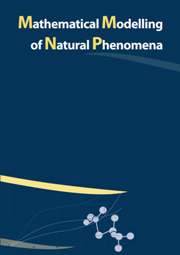Crossref Citations
This article has been cited by the following publications. This list is generated based on data provided by
Crossref.
Blackshaw, Rod P.
2009.
A comparison of management options for leatherjacket populations in organic crop rotations using mathematical models.
Agricultural and Forest Entomology,
Vol. 11,
Issue. 2,
p.
197.
Petrovskii, S.
Morozov, A.
Malchow, H.
and
Sieber, M.
2010.
Noise can prevent onset of chaos in spatiotemporal population dynamics.
The European Physical Journal B,
Vol. 78,
Issue. 2,
p.
253.
Benefer, Carly
Andrew, Peter
Blackshaw, Rod
Ellis, Jonathan
and
Knight, Mairi
2010.
The spatial distribution of phytophagous insect larvae in grassland soils.
Applied Soil Ecology,
Vol. 45,
Issue. 3,
p.
269.
Díaz Rodrigues, Luiz Alberto
Mistro, Diomar Cristina
and
Petrovskii, Sergei
2012.
Pattern formation in a space- and time-discrete predator–prey system with a strong Allee effect.
Theoretical Ecology,
Vol. 5,
Issue. 3,
p.
341.
Blackshaw, R. P.
and
Moore, J. P.
2012.
Within‐generation dynamics of leatherjackets (Tipula paludosa Meig.).
Journal of Applied Entomology,
Vol. 136,
Issue. 8,
p.
605.
Blackshaw, Rod P.
and
Hicks, Helen
2013.
Distribution of adult stages of soil insect pests across an agricultural landscape.
Journal of Pest Science,
Vol. 86,
Issue. 1,
p.
53.
Bearup, Daniel
Petrovskii, Sergei
Blackshaw, Rod
and
Hastings, Alan
2013.
Synchronized Dynamics of Tipula paludosa Metapopulation in a Southwestern Scotland Agroecosystem: Linking Pattern to Process.
The American Naturalist,
Vol. 182,
Issue. 3,
p.
393.
PETERSEN, MATTHEW J.
SETO, MASANORI
and
PECK, DANIEL
2013.
Linking the spatio‐temporal distribution of an edaphic crane fly to its heterogeneous soil environment.
Ecological Entomology,
Vol. 38,
Issue. 6,
p.
585.
Petrovskii, Sergei
Petrovskaya, Natalia
and
Bearup, Daniel
2014.
Multiscale approach to pest insect monitoring: Random walks, pattern formation, synchronization, and networks.
Physics of Life Reviews,
Vol. 11,
Issue. 3,
p.
467.
Codling, Edward A.
2014.
Pest insect movement and dispersal as an example of applied movement ecology.
Physics of Life Reviews,
Vol. 11,
Issue. 3,
p.
533.
Ryashko, L.
Bashkirtseva, I.
and
Morozov, A.
2015.
Stochastic Sensitivity Analysis and Control for Ecological Model with the Allee Effect.
Mathematical Modelling of Natural Phenomena,
Vol. 10,
Issue. 2,
p.
130.
Benefer, Carly M.
D'Ahmed, Karzan S.
Blackshaw, Rod P.
Sint, Hadewij M.
and
Murray, Phil J.
2016.
The Distribution of Soil Insects across Three Spatial Scales in Agricultural Grassland.
Frontiers in Ecology and Evolution,
Vol. 4,
Issue. ,
Benefer, Carly M.
D'Ahmed, Karzan S.
Murray, Philip J.
and
Blackshaw, Rod P.
2017.
Molecular identification and distribution of leatherjackets (Diptera: Tipulidae) in U.K. agricultural grassland.
Agricultural and Forest Entomology,
Vol. 19,
Issue. 4,
p.
400.
Martay, B.
and
Pearce-Higgins, J.W.
2018.
Using data from schools to model variation in soil invertebrates across the UK: The importance of weather, climate, season and habitat.
Pedobiologia,
Vol. 67,
Issue. ,
p.
1.
Blackshaw, R. P.
and
Esbjerg, P.
2018.
Statistical indicators for insects caught in the development trap.
Journal of Applied Entomology,
Vol. 142,
Issue. 1-2,
p.
272.
Pearce-Higgins, James W.
and
Morris, Roger K. A.
2022.
Declines in invertebrates and birds – could they be linked by climate change?.
Bird Study,
Vol. 69,
Issue. 3-4,
p.
59.
Moffat, A.
Gaffney, M. T.
Brennan, F.
Cole, L.
Jackson, G.
Konkolewska, A.
and
McNamara, L.
2022.
Identification and distribution of leatherjackets (Tipula spp.) in the Republic of Ireland.
Irish Journal of Agricultural and Food Research,
Vol. 61,
Issue. 2,
Moffat, Aisling
Cole, Lorna
Lacey, Seán
Harrison, Billy
Konkolewska, Agnieszka
McCracken, Davy
Evans, Andy K.
Gaffney, Michael T.
Brennan, Fiona
Jackson, Gail E.
and
McNamara, Louise
2024.
Long‐term effects of management intensity and bioclimatic variables on leatherjacket (Tipula paludosa Meigen) populations at farm scale.
Journal of Applied Entomology,
Vol. 148,
Issue. 5,
p.
518.


